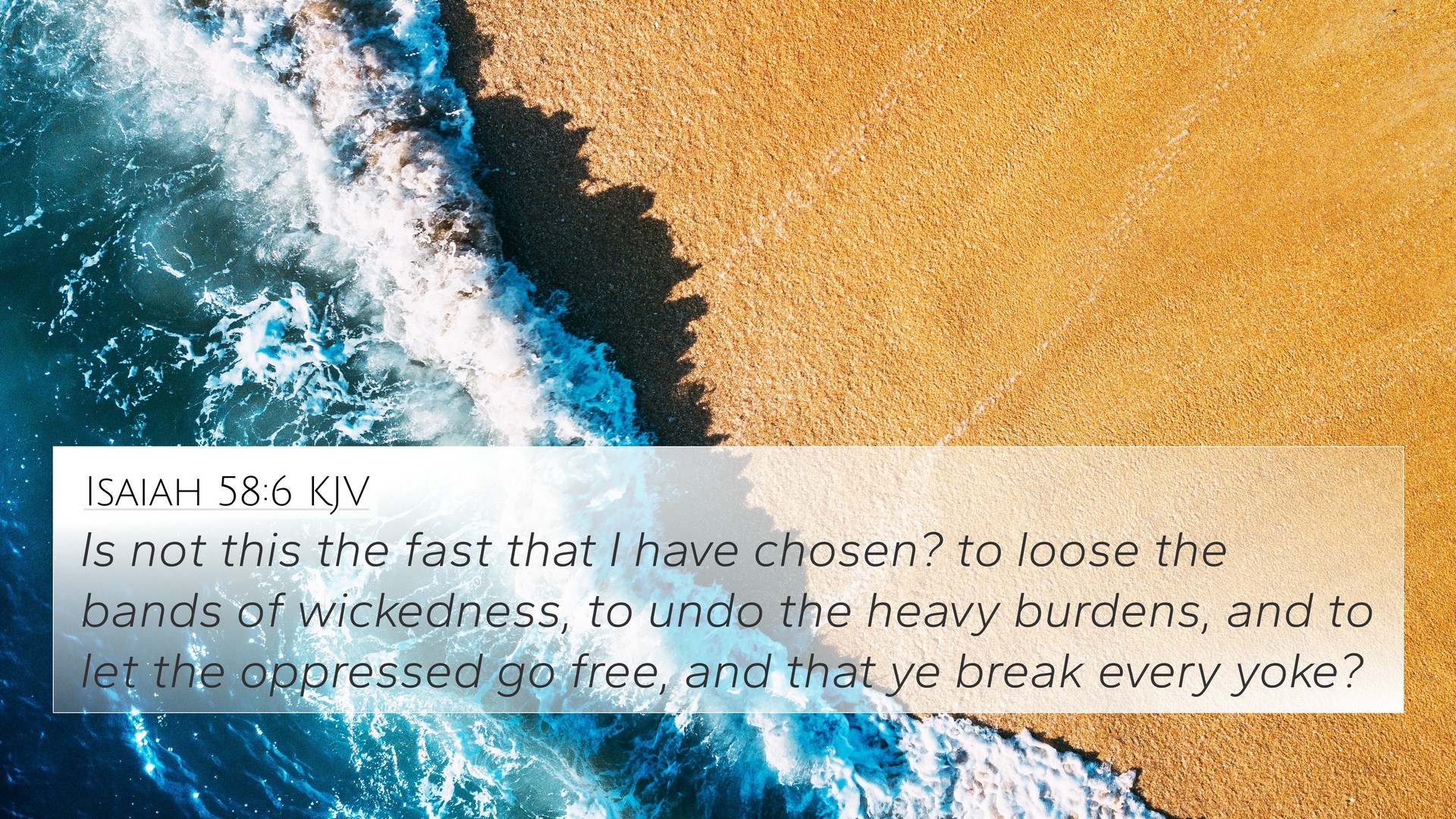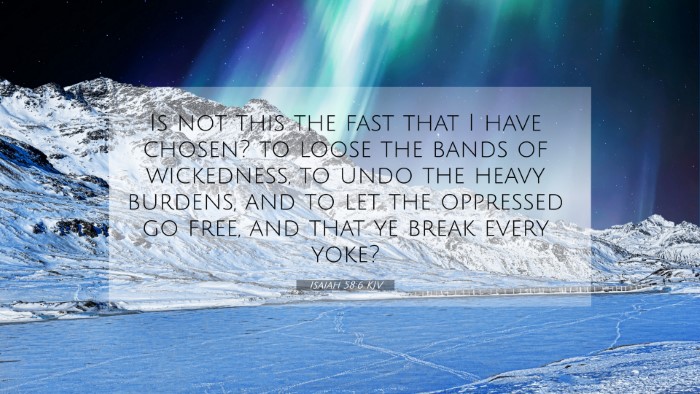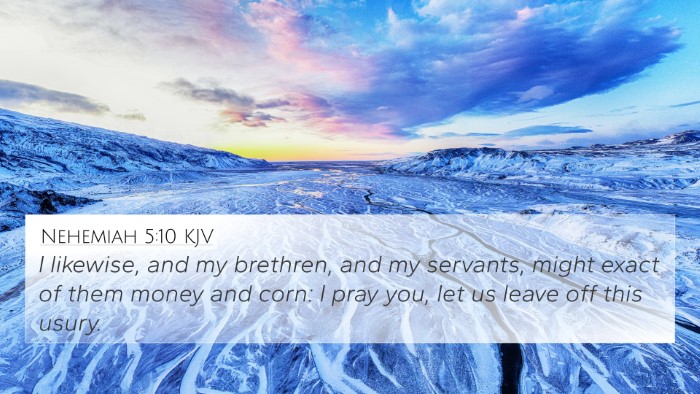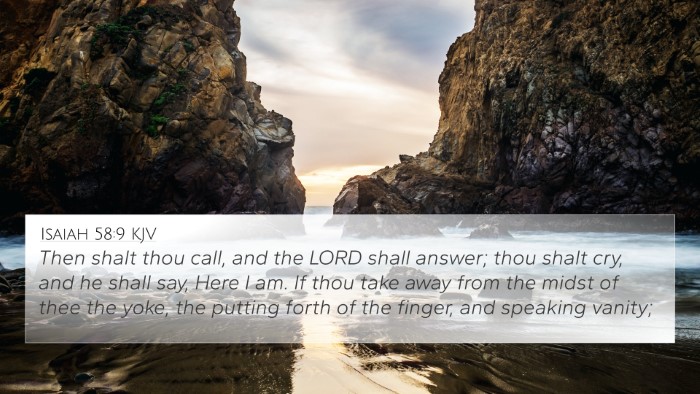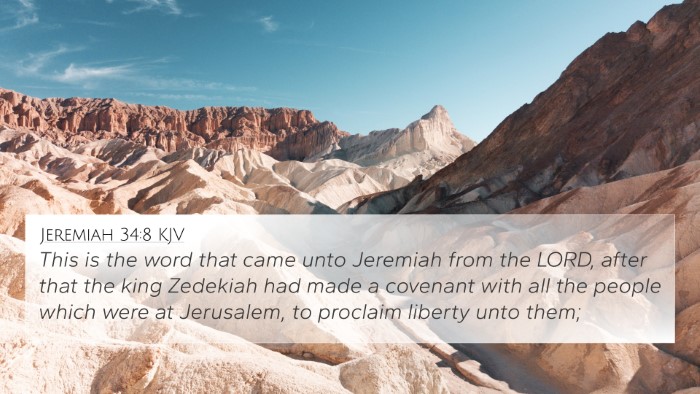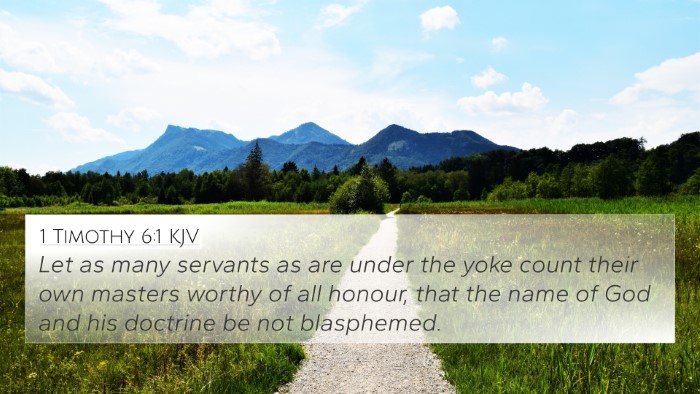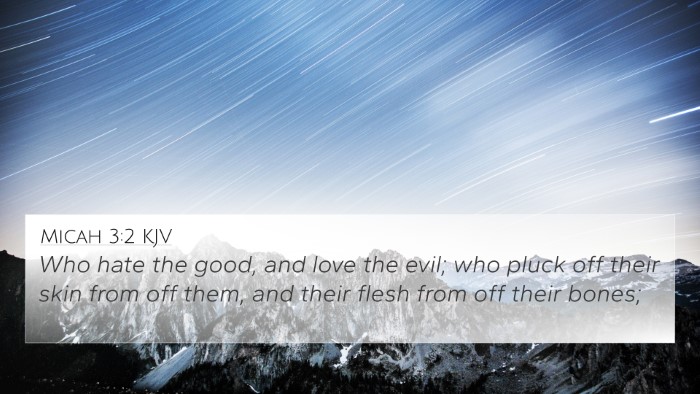Understanding Isaiah 58:6
Isaiah 58:6 states:
"Is not this the fast that I have chosen? to loose the bands of wickedness, to undo the heavy burdens, and to let the oppressed go free, and that ye break every yoke?"
This verse is rich in meaning and calls for a reflection on true fasting and the heart's condition before God. Below, we present a combined summary of insights from public domain commentaries by Matthew Henry, Albert Barnes, and Adam Clarke.
Key Themes and Interpretations
Isaiah 58:6 challenges the traditional practices and outward expressions of fasting. It emphasizes the moral and social responsibilities that extend beyond mere rituals. The following points outline the significant themes of this verse:
- The True Nature of Fasting:
Fasting is presented not just as abstaining from food, but as an active engagement in social justice. The Lord emphasizes that the chosen fast involves liberation for the oppressed and the breaking of spiritual chains.
- Social Justice and Compassion:
The verse underscores the importance of compassion towards those who are burdened and oppressed. True worship involves actions that alleviate suffering, which reflects God's character.
- Spiritual Liberation:
Isaiah points out that part of God's intent in their fasting is the removal of wickedness and burdens, suggesting a holistic approach to spiritual life where internal and external aspects are addressed.
- God's Desire for a Repentant Heart:
Rather than empty rituals, God desires a heart that seeks justice and mercy, reflecting a genuine relationship with Him. A fast that neglects these duties is not pleasing to the Lord.
Connections with Other Biblical Texts
Isaiah 58:6 resonates with various other biblical passages that emphasize similar themes of justice, mercy, and true worship. Below are 7-10 essential cross-references that enrich understanding:
- Micah 6:8: "He hath shewed thee, O man, what is good; and what doth the Lord require of thee, but to do justly, and to love mercy, and to walk humbly with thy God?"
- Matthew 23:23: "Woe unto you, scribes and Pharisees, hypocrites! for ye pay tithe of mint and anise and cummin, and have omitted the weightier matters of the law, judgment, mercy, and faith."
- Luke 4:18: "The Spirit of the Lord is upon me, because he hath anointed me to preach the gospel to the poor; he hath sent me to heal the brokenhearted, to preach deliverance to the captives, and recovering of sight to the blind, to set at liberty them that are bruised."
- James 1:27: "Pure religion and undefiled before God and the Father is this, To visit the fatherless and widows in their affliction, and to keep himself unspotted from the world."
- Proverbs 31:8-9: "Open thy mouth for the dumb in the cause of all such as are appointed to destruction. Open thy mouth, judge righteously, and plead the cause of the poor and needy."
- Isaiah 1:17: "Learn to do well; seek judgment, relieve the oppressed, judge the fatherless, plead for the widow."
- Jeremiah 22:3: "Thus saith the Lord; Execute ye judgment and righteousness, and deliver the spoiled out of the hand of the oppressor: and do no wrong, do no violence to the stranger, the fatherless, nor the widow, neither shed innocent blood in this place."
- Romans 12:1: "I beseech you therefore, brethren, by the mercies of God, that ye present your bodies a living sacrifice, holy, acceptable unto God, which is your reasonable service."
- Galatians 5:13: "For, brethren, ye have been called unto liberty; only use not liberty for an occasion to the flesh, but by love serve one another."
Importance of Cross-Referencing in Biblical Studies
To deepen your understanding of scripture, employing Bible cross-reference systems can be an invaluable tool. Here are some key strategies for effective study:
- Using a Bible Concordance: A good concordance can help find related verses and themes, guiding you to critical connections within the text.
- Connecting Old and New Testament Themes: Identifying the continuity of themes such as justice and mercy from the Old Testament through to the teachings of Christ enriches one's understanding of God’s plan.
- Comparative Study of the Gospels: Noting parallels in the different Gospel accounts regarding social justice enhances comprehension of Jesus’ mission.
- Engaging in Group Study: Discussing verses in a community can unveil new insights and facilitate a deeper understanding of scripture.
- Utilizing Commentaries: Public domain commentaries provide context, historical background, and interpretative insight into specific passages.
Conclusion
Isaiah 58:6 invites believers to re-evaluate traditional practices of worship and embrace an active faith characterized by justice and mercy. The scriptures urge Christians to embody God's love through social action, reflecting His character in all aspects of life. Being engaged in detailing the connections between Bible verses not only enhances personal growth but also promotes communal harmony and understanding amongst believers.
